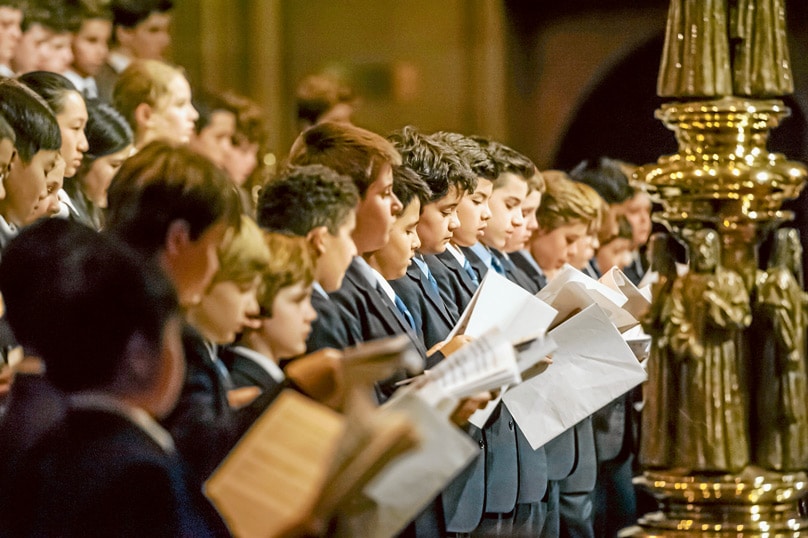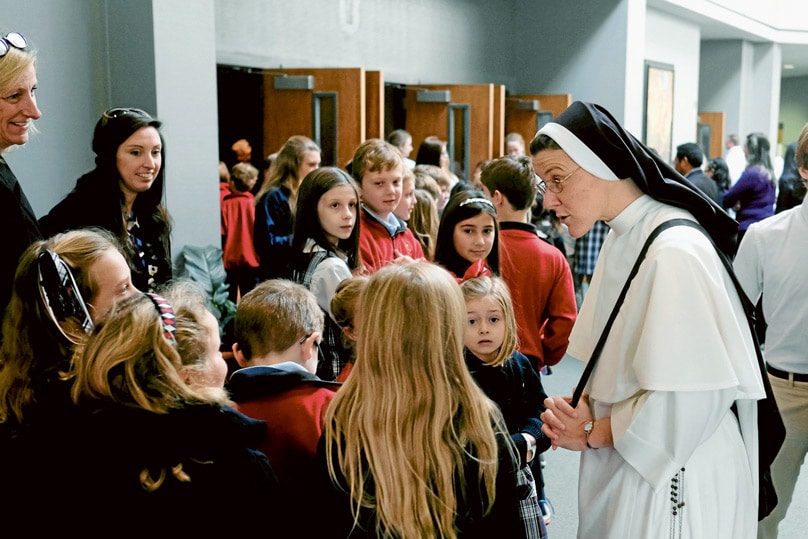
In response to a number of articles in The Catholic Weekly on the Leuven Project, an article in its defence was recently published online.
Those articles which have critiqued the Project “cast a slur on the bishops of the dioceses where the research is being undertaken … and undermine the very authentic efforts being made to strengthen the religious identity of our Catholic Schools”, wrote Stephen Elder, the Executive Director of Catholic Education for the Archdiocese of Melbourne.
(Catholic Weekly: Previous articles are available here: Stephen Elder, Monica Doumit, Patrick McGregor, Fr Brendan Arthur, Paul Sharkey and Fr John Flader.)
My writing on the Project casts no slur on anyone. It assumes the good faith of all involved. However, I do intend to raise an alarm and question whether the Project will strengthen or weaken the religious identity of our Catholic Schools. A free and frank discussion is needed.
A recent pastoral letter by the NSW Bishops expressed the aim of “ensuring that our schools are … centres of the new evangelisation”. It has been my contention that the Leuven Project is incompatible with this goal.

The Leuven Project is based upon the re-contextualisation theology of Lieven Boeve, which seeks to salvage the correlation theology of Edward Schillebeeckx, and what is commonly called contextual theology.
Correlation theology sought to emphasise similarities between Catholic faith and practice, and the beliefs and practices of non-Catholics, for example, a willingness to work for peace and justice. Regarding this approach as outdated, Project-determined schools seek to go beyond it.
Contextual theology emphasises that every community of people exists in a different cultural context – sociological, linguistic, religious, historical, ethnic, etc. The Project regards this approach as no longer adequate in a “post-modern” world because in this world our contexts are always changing.
A fundamental reason for the Project’s dissatisfaction with correlative and contextual theologies is that its philosophical roots lie largely in the thought of Jean-François Lyotard, who claimed that what he called “meta-narratives” are no longer convincing.
https://youtu.be/j7WWMkIOlsw?t=2m38s
Put simply, a meta-narrative is a Story Which Explains Everything. From the Dreamtime to Marxism, a meta-narrative claims to explain everything in existence. One can only accept one meta-narrative as true. When presented with two, one must choose between them. Nazism and Marxism are good twentieth-century examples of this.
However, in the relativism of our post-modern context, the idea that there can be a Story Which Explains Everything is no longer accepted by many people. You have your truth and I have mine. Also, our context is continually changing. For example, now our context includes the issues of same sex marriage and gender fluidity. For the Project, the dialogue between Catholics and non-Catholics must be continually re-contextualised.
The best we can do is dialogue about our respective truths, truths which are conveyed by symbols which must be continually reinterpreted. Perhaps in doing so you will learn something valuable from me or I will learn something valuable from you.
The Project advises that Catholic schools should have a preferential option for the Catholic narrative. However, it does not make clear why we should believe our narrative rather than someone else’s.
What Boeve suggests is that the Catholic narrative needs to be “open,” that is, open to being challenged and changed by a God who “interrupts history”.

This “interruption” can come from a non-Catholic narrative, thus revealing God in new ways. Yet how is one to discern that the interruption is true? Also, notice that for Boeve it is “God,” not “Christ,” the Word made flesh, who interrupts history.
Despite Stephen Elder’s claim that “The Leuven research embodies the principles of interpretation used generally by Catholic theologians [Elder],” many Catholic theologians who are conversant with post-modernism are severely critical of re-contextual theology.
For example, for Boeve, Jesus is not the Logos, the Word of God. Rather, he is only “the way to the Logos”. Is Boeve a disciple of Jesus Christ or Jean-François Lyotard? Is he a Catholic or a new kind of Arian?
Furthermore, Leuven Project researchers are utterly convinced that God is exclusively transcendent.
Thus, “Post-critical Belief stands for a symbolic affirmation of faith contents. It is characterised by faith in a transcendent God and in a religious interpretation of reality in which the transcendent is not considered literally present but is represented symbolically. God is the radical “other” to whom we relate through a symbolical representation, through the interpretation of a sign that refers to the transcendent.
People relate to the transcendent reality through mediations only: through stories, rituals, traditions, institutions, churches, ministries, communities, social organisations, and so forth. Faith is acquired through the active, creative, and interpretative handling of these mediations . . . . [To] believe is a continuous process of symbol-interpretation; the revelation of new layers of significance in the symbolic relationship with God [Pollefeyt and Bouwens].”
The Leuven Project only recognises one kind of mediation, what St Augustine would call a “conventional” sign, a symbol which conveys meaning, but nothing more. The only alternative to “mediated” is identified by the terms “literally present,” “immediate,” or “unmediated”.
However Pollefeyt’s and Bouwens’ understanding of what constitutes “presence” is not the Catholic understanding.
Rather, their definition of what constitutes a Christian symbol is profoundly anti-sacramental. There is no middle ground between a symbol which only mediates meaning and the kind of presence of Christ such as Jesus’ Jewish listeners assumed when they asked, “How can this man give us his flesh to eat? (John 6:52)”
For a Catholic, the sacraments are mediations which not only convey meaning but the very life of God.
They “are efficacious signs of grace, instituted by Christ and entrusted to the Church, by which divine life is dispensed to us. The visible rites by which the sacraments are celebrated signify and make present the graces proper to each sacrament [Catechism of the Catholic Church, 1131].”
According to Pollefeyt, “the Catholic tradition is, from my perspective, the most powerful, the most deep, the most authentic and the most thorough way of relating to reality and to the Divine”.
However, Pollefeyt’s “perspective” is, for him, only one of many valuable perspectives in a post-modern world, not one which can be presented as a participation in God’s perspective.
Also, when speaking of God, Pollefeyt does not use a proper noun, like “Christ” or “God,” but the nominal form of an adjective, “the Divine”. Divine what?
He uses this term because he understands “relating” to “the Divine” as a process of interpreting ever changing symbols, not relating to the Father, Son, and Holy Spirit who abide in us and in whom we abide. For him, God is radically absent and unknowable.
On the question of enhancing Catholic School identity, Boeve and the Project present Catholic educators with four options: 1. To secularise (abandon all claims to a Catholic identity) 2. To re-confessionalise (reassert what is distinctive about Catholic identity in opposition to secular society). 3. To harmonise (present the Catholic faith in a way which correlates with secular society or 4. to re-contextualise.
What is not presented is a fifth option: to evangelise. This is because Boeve is convinced that what the last three Popes have called the new evangelisation is doomed to failure, since he thinks that it is predicated on us living in a “modern” rather than a “post-modern” world, a world which still believes in meta-narratives.
Correlational, contextual, and re-contextual theologies convince some people because they present partial truths. There are elements of Christianity which can be correlated with non-Christian beliefs and practices. People do live in different cultural contexts. These contexts are changing.
However, the fundamental oversight of correlational, contextual and re-contextual theologians is a failure to grasp that our context as Christians is infinitely larger than this.
As Christians, we do not just believe in and proclaim a meta-narrative. We do not just believe in and proclaim a story – we are in the story! We have been baptised into Christ, and we invite others to be baptised into the story with us.
The fullness of our context is that “I have been crucified with Christ; it is no longer I who live, but Christ who lives in me” (Gal 2:20). Thus “we all, with unveiled face, beholding the glory of the Lord, are being changed into his likeness from one degree of glory to another” (2 Cor 3:18).
The Project has no place for our ongoing divinisation, our becoming more and more “Christified”.
What form might the evangelisation option take? A clue can be found in ministries such as the National Evangelisation Teams and Youth Mission Teams which currently go into many Australian Catholic Schools.
These teams witness to both staff and students in two ways. First, they witness to how God has “interrupted” their own lives.
They are doing what Jesus told the man possessed by a legion of demons to do – “Go home to your friends and tell them how much the Lord has done for you, and how he has had mercy on you” (Mark 5:19).
Second, they witness, through their relationships with each other, to how God has transformed these relationships by enabling them to love each other as brothers and sisters in Christ. “By this all men will know that you are my disciples, if you have love for one another” (John 13:35).
The identity of Catholic Schools cannot be enhanced unless they have within them staff and students who can testify that the love of God has been poured into their hearts through the Holy Spirit who has been given to them (cf. Rom 5:5), and in whom others can see the fruit of that self-same Spirit – “love, joy, peace, patience, kindness, goodness, gentleness, and self-control” (Gal 5:22-23).
Videos and links added
